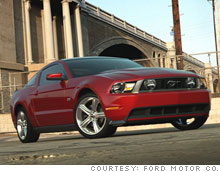Is it a Mustang without that V8 growl?
EcoBoost technology is set to become a centerpiece in Ford's fuel economy strategy, but Mustang drivers want none of it.
 |
| 2010 Ford Mustang |
NEW YORK (CNNMoney.com) -- Drivers looking for fuel efficiency and performance may cheer Ford's efforts, but for Mustang fans who demand a burbling V8, fuel economy takes a back seat to tradition.
"Some people just love the sound of a V8," said Bob Fascetti, head of V8 and V6 engine development at Ford, "They want that exhaust growl that only a V8 can provide."
For this reason Ford has bowed to Mustang fans' demands that it stick with V8 power in the Mustang "for the foreseeable future," in the words of a Ford spokesman, even though the new EcoBoost V6 engine, just introduced the rest of its fleet, already provides more power and fuel economy than the current Mustang V8.
In a recent long-term test drive of the Ford Taurus SHO with the EcoBoost V6, the engine delivered a surprisingly lively impersonation of a V8. That included a respectable rumble during hard acceleration thanks to a simple device that amplifies the proper engine sounds, piping the burbling note back into the cabin.
The 3.5-liter V6 in the Taurus SHO produces 365 horsepower and 350 foot-pounds of torque. Compare that to the 315 horsepower and 325 foot-pounds produced by the 4.6-liter V8 offered in today's Mustang. Plus, the Taurus is a roomy full-size family sedan and it gets better fuel economy than the Mustang, a much smaller two-door car.
EcoBoost uses turbocharging and sophisticated fuel injection technology to get more power from a gallon of gasoline.
Given all that, the EcoBoost V6 would seem like a good choice for future versions of the Mustang GT. In fact, Ford says, smaller EcoBoost engines may be offered for the economy-minded, but for now the V8 will remain king of the Mustang hill.
To many, a V8 engine remains an important part of the automotive experience, even if something smaller offers largely the same punch when they step on the gas.
"If you've got a retro car with a retro design, that shouldn't be too surprising," said Todd Lassa, Motor Trend's Detroit editor.
While the majority of Mustang's sold today have V6 engines already, it's the performance-oriented V8 that the car is known for. Even V6 buyers want that association with the big rumbling V8s, Lassa said, and would be disappointed if it were no longer available.
"It's the sound, it's the bragging rights, it's the authenticity of the car," Lassa said.
But where those emotional ties don't exist, in new models like the Taurus and the Lincoln MkS luxury sedan, the top-of-the-line engine that once would have been a V8 is now an EcoBoost V6 designed to squeeze every ounce of power from a smaller engine that burns less gas.
Within about three years, EcoBoost engines of various sizes will be available on about 90% of Ford Motor Co.'s cars and trucks, Ford has announced. Non-EcoBoost engines will also be offered, but even those will incorporate aspects of the technology.
With these new engines, getting past customers' misgivings about performance is simply a matter of letting them experience the product, said Ford spokesman Alan Hall.
"Just get in the car and drive it and tell me if you still have concerns over not having a V8," salespeople tell customers, he said.
There's nothing fundamentally unique about EcoBoost, said Jeff Jowett, an industry analyst with the consultancy CSM Worldwide. Other automakers, particularly in Europe, use direct fuel injection combined with turbocharging.
"What's unique is the fact that it's going to be their big volume technology going forward," he said.
Applying EcoBoost's relatively inexpensive technology as broadly as possible will make it easier for Ford to hit tough new Corporate Average Fuel Economy targets without having to rely as much on sales of much more expensive hybrid or diesel-powered vehicles.
The reason this sort of technology is becoming mainstream right now is that tiny on-board computers have finally made it possible, said Luke Cruff, an engineer with Ricardo, a 101-year-old engine technology consultancy. Ricardo was not involved in Ford's EcoBoost program.
Faster computer chips and improved software algorithms allow for the precisely timed injections of fuel and controlled use of turbo boost that make systems like this work, especially with regular gasoline which is less tolerant of high pressure than more expensive "premium" gasoline.
"If we had this conversation even three years ago," he said, "things would have been completely different." ![]()

